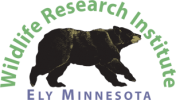Honoring Dr. Jane Goodall - UPDATE October 2, 2025
Dr. Jane Goodall has been my hero from the time I began studying bears in 1967. She was studying chimpanzees in a kinder, gentler way than anyone before. She was courageously using her trust-based method to learn more about them than anyone could have dreamed. Inspired by her, I wished I could study wild bears like that, but from what I knew at the time, I didn’t think it was possible.
In the early 1980’s, the bears proved me wrong. Wild bears began showing trust. Following her methods, 1984 marked the beginning of the kind of learning she had demonstrated.
I faithfully followed her work, but I never had an opportunity to meet her until October 30, 1997. We were both giving lectures in Ontario, and the person in charge of my lecture tour arranged for us to meet in London, Ontario before her lecture. She was gracious, humble, and fun to talk with. With our hearts for wildlife, we hit it off in a way that made me thankful ever since. She began by surprising me by introducing me to her audience. She joined the North American Bear Center’s Board of Advisors. When we were having a nice talk at a location where we were doing back to back lectures, she suddenly had an idea and said she had to go do something. When I was about to give my lecture, she surprised me with wonderful words she had just written as her surprise introduction of me. When she saw that I needed help, she wrote a well-worded letter to Minnesota Governor Mark Dayton on August 8, 2013, saying: “I have known Dr. Lynn Rogers and his work with black bears for many years. His is one of those rare long-term studies where each successive year makes the whole that much more valuable. Like chimpanzees, bears are long-lived individuals, each with his or her own personality. Long-term research in which individuals are known allows one to ask questions that are not possible in short-term or ecological studies. I believe it would be a scientific tragedy if this research, conducted by a scientist who truly cares about his subjects, is brought to an untimely close. Research on the Gombe chimpanzees is now in its 54th year, and we are still learning completely new things. Just as Dr. Rogers and his team are still learning new things about the bears. I very much hope that the plan of closing down this research can be dropped. Science will not benefit else, nor will the bears.”
Earlier, I could hardly believe it when Harvard Professor E. O. Wilson mentioned my work in the same paragraph as hers, writing: ‘As in Lynn Rogers’ black bears, Iain Douglas-Hamilton’s elephants, and Jane van Lawick-Goodall’s chimpanzees, a new level of resolution has been attained, in which free-ranging individuals were tracked from birth through socialization, parturition, and death, and their idiosyncrasies and personal alliances recorded in clinical detail.’
Dr. Jane Goodall has done more for the welfare of wildlife than anyone I know. I hope her message will continue strong as part of her legacy. She is still my hero.
Thank you all for all you have done and will do to benefit wildlife as part of that message that we all share. And thank you Jane for what you started and spent your life making so effective around the world.
Lynn Rogers, Biologist, Wildlife Research Institute and North American Bear Center

